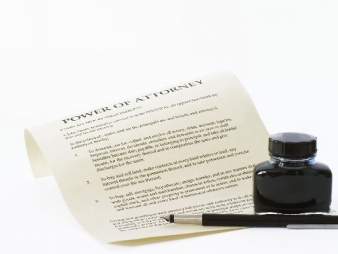I often get asked by clients if they should add one of their children to a bank account to help pay bills. I answer by telling them the potential negative repercussions to adding a child’s name to a bank or investment account.
First, when you “add” a child’s name to a bank account you are making that child a joint owner with you on that account. That means the child has every ownership right you have on that account. The child could withdraw all the money if they chose to do that. There is no requirement that the child use that money for your benefit.
Even if the child only intends to do what you would want them to do with the money in the account, there could be some unforeseen problems jeopardizing the money in the account. For instance, if the child gets in a car accident, gets sued and has a judgment against them; the money in that account is considered the child’s money just as much as your money. Therefore, that money can be susceptible to the child’s creditors.
When you own an account jointly with a child, upon the death of one of the joint owners, that account is owned solely by the surviving joint owner. Your will does not have any power over the disposition of a joint asset. Therefore, if you die, your child will own that account outright and has no legal obligation to use that money for any of your final bills, expenses, funeral costs, etc. Furthermore, that child has no obligation to share any of that money with anyone else you may have provided for in your Will.
Even if none of these issues is a concern to you, your child may not want to be a joint owner with you on an account. Again, adding a child’s name to an account gives that child an ownership interest in the account. Therefore, your child may be required to list that account as one of their assets if they are applying for any type of financial aid for college tuitions. The value of that account may cause your child to appear to have more financial resources available to them than what is truly available for their use. If your child receives any need-based government aid, they may need to disclose that account as one of their resources and thereby jeopardize their ability to continue to receive such benefits or qualify for such benefits.
If you want to have a child available to help assist you with your finances in the event you get sick, there are other ways to accomplish that goal without adding the child as an owner to the bank account. The most common method is to give your child your financial Power of Attorney. Your Power of Attorney is a document that you sign which gives your child the power to access your accounts, deposit money into your accounts, pay bills, sell real estate, and any other financial power that may be necessary to assist you with your finances if you are unable to continue to independently handle your own finances. This Power of Attorney is a fiduciary power given to someone else on your behalf. That person then acts in a fiduciary role for your benefit. In other words, that power holder must act on your behalf and use the funds for your benefit and not use the funds for themselves.
Giving someone your Power of Attorney eliminates the need to add them to an account as an owner. Instead, you give your financial institution a copy of your Power of Attorney document and they will add that power holder to the account in the role as Power of Attorney – not an owner. Your child will then have the ability to deposit money into that account, pay bills from that account, and withdraw money on your behalf from the account. You can obtain a Power of Attorney document from your estate planning / elder law attorney and they can fully explain the powers you are giving and whether you may want to give additional powers to assist in your overall estate plan or long term care plan.
It is important to note that your Power of Attorney should be educated in their responsibilities and limitations of their fiduciary role as a Power of Attorney. While they may be innocently acting on your behalf, their bookkeeping methods may cause them problems in the future. For instance, the Power of Attorney should not co-mingle your funds with their funds. They should keep track of all deposits and expenditures as well as receipts reflecting such deposits and expenditures. They want to ward against any appearance of impropriety in the event a family member questions their methods after you pass. Again your estate planning / elder law attorney can help advise your Power of Attorney of their responsibilities and limitations.
Finally, it is important to note that once you pass, your Power of Attorney is null and void. Your Power of Attorney will no longer be able to access your accounts in their role as Power of Attorney. However, if you name the same person in your Will to be the Executor of your estate, they will be able to access those accounts in their role as Executor. The subject of the role as Executor is beyond the scope of this article.
In conclusion, there can be negative repercussions to adding a child as an owner on a bank account. If your intention is to give someone access to your accounts so that you have someone to help you with your finances in the event you are unable to independently handle your own finances, you can accomplish that goal through a Power of Attorney.
Tagged In:Estate PlanningPower of Attorney




